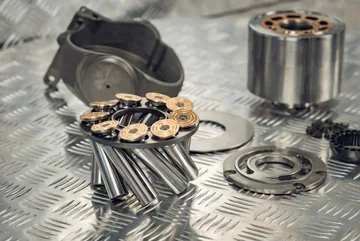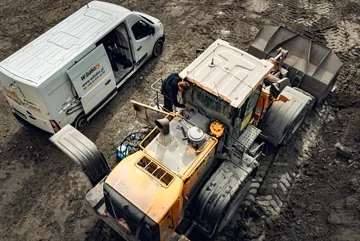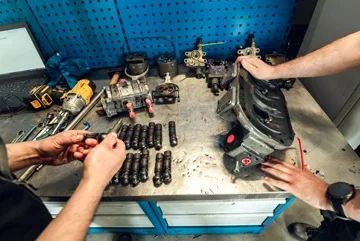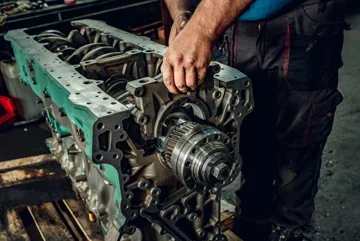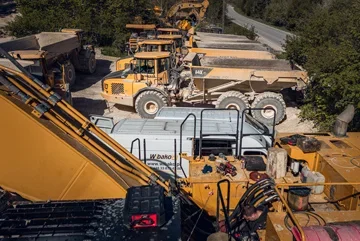Very Rare Design – Air-Cooled Deutz V10!
In the world of industrial engines, there are many designs that have made their mark in history with their reliability, durability, and simplicity. However, today we will go back to the times when air cooling technology was commonplace. The hero of this entry is Deutz F10L 513 – a unique air-cooled V10 engine that, despite its age, still impresses with the simplicity and ingenuity of its engineers.
Air-Cooled V10 Engine – A Unique Global Specimen
Although in the world of motorsport – such as Formula 1 – V10 engines reached up to 20,000 RPM, the specimen presented today operates quite differently. Deutz F10L 513 is a classic, naturally aspirated V10 unit designed for industrial use, not for the racetrack. Instead of competing against time, this engine was created to run for years – without unnecessary electronics, turbochargers, or computer controllers.
It is precisely this simplicity that makes it exceptional. This design was used in construction machinery, power generators, and technological vehicles. Today, such engines are true rarities that could easily be placed in a technology museum.
How Does Air Cooling Work in Deutz F10L 513?
The most interesting element of this design is the air cooling system. Unlike modern liquid-cooled units, the air-cooled Deutz uses a fan that draws in and directs air through specially shaped channels. The fan housing does not rotate – only its internal rotor spins. The entire system is designed to ensure an even airflow around the cylinders and heads.
Thanks to the appropriate ribbing of the cylinders and aluminum heads, heat is effectively dissipated, even in extreme conditions. That is why the Deutz F10L 513 was nearly impossible to overheat. The condition was simple – the engine had to be functional and properly maintained.
Simple Construction and Reliability in Practice
The F10L 513 engine is a design from an era when mechanics was synonymous with durability. 90-degree cylinder arrangement, a cylinder diameter of about 125–128 mm, a Bosch mechanical fuel injection pump, and a minimal number of sensors – these are the features that make it extremely reliable.
The fan in this model was hydraulically driven – oil pressure determined its speed. The hotter the engine got, the faster the fan spun. Simple and brilliant in its functionality. Versions marked "BF" were additionally equipped with turbochargers, while the "F" model – like in our case – remained naturally aspirated, offering a more "pure" sound of operation.
Why Does Deutz F10L 513 Still Inspire Admiration?
- Reliability – regular filter and oil changes are enough for the engine to run for years.
- Easy Service – the lack of complicated electronics and sensors means fewer failures and simpler repairs.
- Durable Construction – cast iron cylinders, aluminum heads, and precise workmanship ensure longevity.
- Versatility – used in many industrial machines, generators, and technological vehicles.
Original Engineering Solutions
One of the more interesting solutions applied in this engine is the air channel integrated with the housing. The cooling air is not dispersed randomly but is precisely directed where it is most needed – to the cylinders and heads. Additionally, many versions were equipped with external oil coolers that supported the cooling process, and in turbocharged variants – also an intercooler.
The interior of the engine is a true school of mechanics. Timing driven by gears, a camshaft located in the housing, and valve actuation via pushrods – this is a system that has operated flawlessly for decades. The Bosch mechanical fuel injection pump with ten sections ensured even operation of all cylinders, and thanks to the simple fuel system, the engine was very resistant to fuel contamination.
50 Years and Still Running!
Although the Deutz F10L 513 design is about half a century old, many specimens are still operational in the field. This is due to the simplicity that is hard to find in the world of modern engines today. It is enough to take care of the cleanliness of the ribbing, regularly change the oil, and monitor the fuel level for the engine to operate smoothly in any conditions.
This is a true testament that mechanical precision and engineering simplicity can withstand the test of time. In an age of computer controllers and complicated cooling systems, the Deutz F10L 513 reminds us how much can be achieved when designers are guided by common sense rather than the fashion for technical fireworks.
Summary
Deutz F10L 513 is not just an engine – it is a symbol of an era when durability and reliability were paramount. Air cooling, lack of electronics, and solid, modular construction make it a design that has stood the test of time. Today, such engines are becoming increasingly rare, and their sound reminds us that mechanics can be an art.
If you are interested in similar topics, check out our YouTube channel, where we show from the inside how legendary designs look and their modern restorations. And if you own a Deutz engine and need parts – you will find them in our online store.














